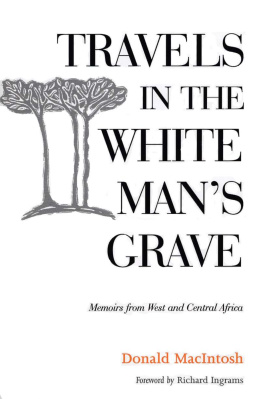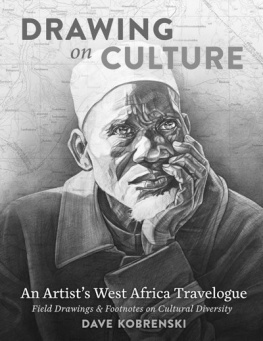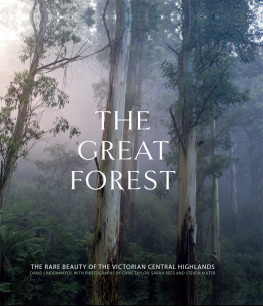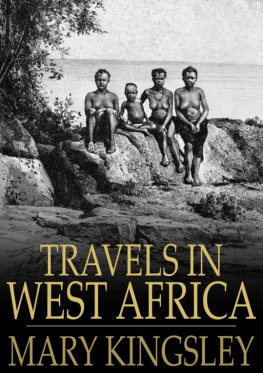DONALD MacINTOSH
TRAVELS IN THE
WHITE MANS GRAVE
Foreword by Richard Ingrams
NEIL WILSON PUBLISHING GLASGOW SCOTLAND
To the memory of my father and grandfather who nurtured my childhood curiosity about those faraway places with the strange-sounding names
Richard Ingrams
FOREWORD
T his is the age of the professional and the specialist. In the world in which I live magazine journalism and publishing writing is considered an activity which is best left to the card-carrying members of the Union. The amateur, the outsider, the part-timer, is unlikely to get a look in.
One of my great pleasures, therefore, since helping to launch The Oldie in 1992, is the large amount of unsolicited material that has come my way much of it from men and women who have taken up writing as a second career. And why not? Writing is something anyone can do like photography. You need no special training, only a way with words, something that cannot be acquired at a university or evening class.
Few unsolicited submissions have given me so much pleasure as those of Donald MacIntosh. Not only was he a natural writer but he had a lifetimes experience in Africa to draw on. His stories of African life (some of which we published in The Oldie) were not only warmhearted and witty. They conveyed the atmosphere of colonial Africa with a wealth of vivid description.
I was especially amused that one of the stories called Magic Sperm, had been rejected by the editor of Punch, Mr MacIntoshs fellow-Scotsman Peter McKay on the grounds that its title would cause offence.
In this book he recounts with the same good humour and the same descriptive power his experiences in the White Mans Grave. I can warmly recommend it.
Chapter 1
TRAVELLER IN AN ANTIQUE LAND
Take care and beware the Bight of Benin;
Theres ten comes out for twenty goes in.
T he first thing you notice is the heat. You expect heat in the tropics, but this is something else. This is heat such as you have never known before, and it is like no heat you are ever likely to encounter anywhere else. It is a far cry from the sort of heat you have just left the drowsy, clean heat of an English springtime, with the gentle fragrances of meadowsweet and clover lingering in the evening air. Nor can it be compared to the heat of the Costa Brava, the sort of heat that is born of Mediterranean skies and silver sands and placid seas. It is not even the heat of the open savannahs fringing the great desert you have just flown over the shimmering, relentless heat that turns every scrubby bush and blade of grass to a drab and uniform beige; a glare of heat that reflects from the white gowns of tall Fulani herdsmen as they chivvy their cattle along endless dusty trails to coastal markets, and dazzles the eyes with its hurting fierceness.
This heat is like none of those. This heat is savage and smothers you in its clammy embrace the moment you step out of the plane, cloying, suffocating in its viscous intensity. You try to breathe in deeply and your lungs fill, not with cool draughts of civilized air, but with some alien mixture that seems to have the consistency of thin, warm porridge.
And it smells. You have only just arrived, but already the coolness of the plane interior is a fast-fading memory. You are on the tarmac of an international airport but already you are aware of the hot wet aroma of the bush all around you, an unforgettable mishmash of olfactory delights in which elderly socks and mouldering cabbage leaves vie with each other for pre-eminence. Now you know what the first gilled horror ever to set foot on land must have inhaled when it crawled out of the primordial sea to take its first tentative sniff of the earths virgin air.
I picked up my bag and began to walk to the customs shed. A lizard shot from under my feet and scuttled across the tarmac. It stopped abruptly about five yards away and looked at me over its shoulder. It was about a foot long, with a slate-blue back and a bright orange head. It had a long, tapering tail ringed with dull orange and white hoops and it did manic press-ups on the blistering tar as it studied me. It looked like a dragon in miniature.
A movement beyond it caught the corner of my eye and I looked up in time to see another lizard launch itself from the roof of one of the airport buildings. It sailed through the air like a doomed hangglider to land with a resounding splat on its belly 12 feet below. Apparently unharmed, it immediately engaged in ferocious combat with the first lizard, attacking it for no other apparent reason than to pass the time of day. I looked up at the roof from where it had thrown itself. There were legions of lizards up there, every square yard of the asbestos sheeting covered with them, sunning themselves. Some were of the size and colour of the two now scrapping in front of me, but, from their much smaller size and sombre hue, it was obvious that the majority were female. Two of those clung to the wall of the shed, watching with feigned disinterest the fracas raging below them, but the others lay torpid on the baking roof, eyes heavy-lidded, dreaming lizard dreams, awaiting the cool of the evening and the bonanza of insects that the lengthening shadows would bring within their reach.
Lizards and smells and sweltering heat. Little did I think at that moment that this would be my life for the next quarter of a century.
The Africa of those days was still in the grip of colonialism, but it was the grip of a tired and feeble old man. A new Africa was rising, and this Africa was vibrant and raucous and challenging. This Africa had no time for tired old men. She was in too much of a hurry.
Nothing exemplified this fact more than Lagos. In the midst of this vast and awful slum of rusting corrugated iron this gigantic, sprawling, incredibly ugly shanty town a rash of almost equally ugly concrete edifices was sprouting. Office blocks, hotels, restaurants and supermarkets in various stages of completion and incompletion were scattered higgledy-piggledy among the old traditional trading stores; stores that still sold bolts of cloth from Manchester, machetes made in Birmingham and sardines canned in Portugal, much in the way that they had been doing for the past hundred years and more. Jammed in between them and into every conceivable cranny of space were tiny shacks that would offer to sell you anything from a cure for craw-craw to a woman for the night. The stench from the open sewers that meandered stickily throughout this architectural nightmare was quite indescribable.
The racket stupefied the senses. Maniacal taxi drivers roared past at suicidal speeds, their horns honking and hooting and blaring without cessation. Wireless sets and gramophones blasted out African highlife music to the very heavens, market mammies kept up a constant barrage of vituperation at their children from roadside stalls and goats blatted plaintively in every doorway.
The night, I was soon to find, was even worse. Not only were the normal daytime noises cranked up a decibel or two by everyone and everything making them; they were boosted by the considerable vocal powers of one of the citys most enduring inhabitants. The Nigerian cockerel must surely be the noisiest of its ilk, and Lagos, in those days, must have been blessed with more cockerels per acre than any other city in the whole of Africa. They suffered from chronic insomnia and all of them seemed determined to ensure that every living creature in the city should suffer along with them. They crowed throughout the long, long night in a thousand different sharps and flats. Battle-hardened veterans hurled their hoarse insults far into the darkness from unseen eminences. Lusty young pretenders, at the peak of their vocal powers if not yet of their sexual prowesses, replied from the safety of distant rooftops, and adolescents squawked their timorous unfinished symphonies from their hiding places among the crumbling shacks.






